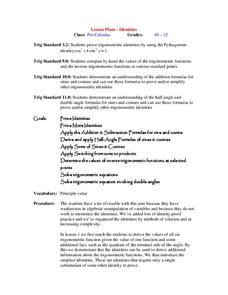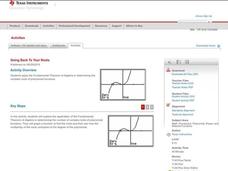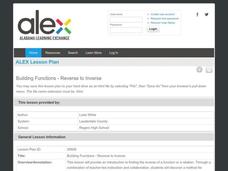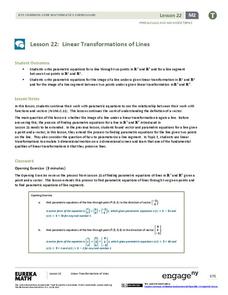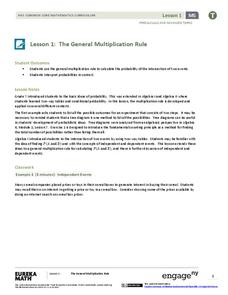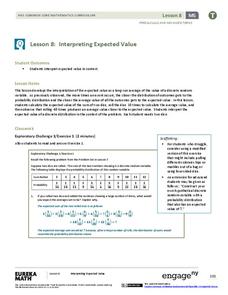Curated OER
Area of a Triangle
Students solve the area of triangles. For this precalculus lesson, students are given two sides of a triangle and asked to calculate the area. They apply the law of sine and the side-angle-side area formula to solve.
Curated OER
Identities and Trigonometric Values
Students solve trigonometric equations. In this precalculus lesson plan, students prove trigonometric identities using the Pythagorean Theorem. They apply the addition formulas for sine and cosine to prove different identities.
Curated OER
Graphical Analysis
Get out your TI-nspire graphing calculator and explore polynomials. Learners determine where a given polynomial are increasing or decreasing, find maximums, minimums, and zeros of polynomials, and discuss end behavior of polynomials....
Curated OER
Going Back to Your Roots
Who doesn't need to know the Fundamental Theorem of Algebra? Use the theorem to find the roots of a polynomial on a TI calculator. The class explores polynomials with one solution, no real solutions, and two solutions. This less lesson...
Alabama Learning Exchange
Building Functions: Reverse to Inverse
Reverse the wrapping to get to the gift. Using the idea of unwrapping a gift, the lesson introduces the concept of inverses. Pupils first determine the order needed to evaluate a function at a point, then use the reverse to find the...
Curated OER
Discovering Conic Sections in the Motion of Heavenly Bodies
Math scholars study conics and how they are used today. In this mathematical lesson, pupils construct and slice cones after viewing a demonstration.
Curated OER
End Behavior of Polynomial Functions
Students identify the end behavior of polynomial functions. In this algebra lesson, students graph different polynomials functions and find a correlation between exponents and function behavior. They identify the effect the leading...
Curated OER
Linear Equations and Matrices
Learners solve systems of equations. In this precalculus lesson plan,students solve linear equations using matrices. They use the Gaussian elimination method to identify the missing variables and simplify the linear equations.
Curated OER
TI-89 Activities for PreCalculus and AP Calculus
Using the TI-89 calculator, students explore the statistical, graphical and symbolic capabilities of the TI-89. Students investigate topics such as solving systems of equations, finding inverse functions, summations, parametrics and...
Curated OER
Precalculus: Function Models for Real-Life Situations
Young scholars use calculators and "by hand" techniques to compare models of real-life data situations, determine the best model for a situation, and use their models to make predictions.
EngageNY
Discovering the Geometric Effect of Complex Multiplication
Does complex number multiplication have the class spinning? Here's a resource that helps pupils explore and discover the geometric effect of multiplying complex numbers. In the 14th installment in the 32-part unit groups look at the unit...
Curated OER
Introduction to Law of Sines
Learners solve problems using the law of sines. In this sines lesson, students work in groups and individually to solve problems using the law of sines. They identify real life problems that require the use of the law of sines. Real...
EngageNY
Complex Numbers as Vectors
Show your math class how to use vectors in adding complex numbers. Vectors represent complex numbers as opposed to points in the coordinate plane. The class uses the geometric representation to add and subtract complex numbers and...
EngageNY
Trigonometry and Complex Numbers
Complex numbers were first represented on the complex plane, now they are being represented using sine and cosine. Introduce the class to the polar form of a complex number with the 13th part of a 32-part series that defines the argument...
EngageNY
Exploiting the Connection to Trigonometry 2
The class checks to see if the formula for finding powers of a complex number works to find the roots too. Pupils review the previous day's work and graph on the polar grid. The discussion leads the class to think about how to reverse...
EngageNY
Linear Transformations Applied to Cubes
What do you get when you combine a matrix and a cube? Well that depends on the matrix! Pupils use online software to graph various transformations of a cube. Ultimately, they are able to describe the matrix that is responsible for a...
EngageNY
Composition of Linear Transformations 1
Learners discover that multiplying transformation matrices produces a composition of transformations. Using software, they map the transformations and relate their findings to the matrices.
EngageNY
Counting Rules—The Fundamental Counting Principle and Permutations
Count the benefits of using the resource. The second installment of a 21-part module focuses on the fundamental counting principle to determine the number of outcomes in a sample space. It formalizes concepts of permutations and...
EngageNY
Using Permutations and Combinations to Compute Probabilities
Now that we know about permutations and combinations, we can finally solve probability problems. The fourth installment of a 21-part module has future mathematicians analyzing word problems to determine whether permutations or...
EngageNY
Linear Transformations of Lines
Discover the extension of parametric equations to model linear transformations. Scholars first write parametric equations to model lines through two points. They then find the parametric equations that represent a linear transformation.
EngageNY
The General Multiplication Rule
In the first installment of a 21-part module, scholars build on previous understandings of probability to develop the multiplication rule for independent and dependent events. They use the rule to solve contextual problems.
EngageNY
Expected Value of a Discrete Random Variable
Discover how to calculate the expected value of a random variable. In the seventh installment of a 21-part module, young mathematicians develop the formula for expected value. They connect this concept the dot product of vectors.
EngageNY
Interpreting Expected Value
Investigate expected value as a long-run average. The eighth installment of a 21-part module has scholars rolling pairs of dice to determine the average sum. They find aggregate data by working in groups and interpret expected value as...
EngageNY
Games of Chance and Expected Value 2
Use expected values to analyze games of chance. The 15th installment of a 21-part module has young mathematicians looking at different games involving tickets and deciding which would be the best to play. They calculate expected payoffs...



